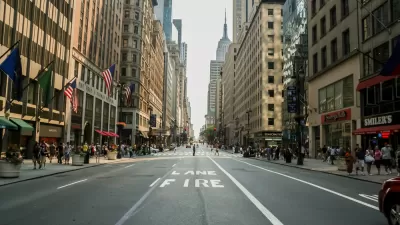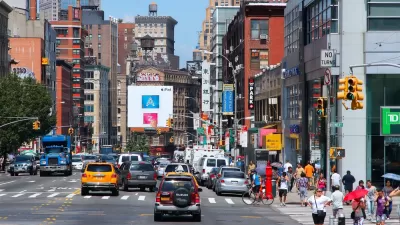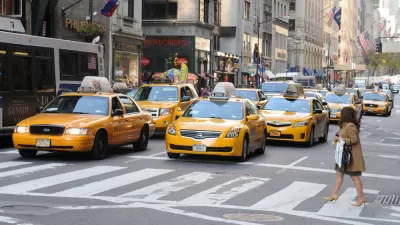While the city determines where to place parking meters and how much to charge, when it comes to charging tolls to drive in Manhattan, the city's elected leaders are excluded from the political process.

Congestion pricing is very much in the news throughout the New York metropolitan area since the Fix NYC panel released their advisory report on Jan. 19 recommending a toll of $11.52 for passenger vehicles and $25.34 for trucks driving south of 60th Street in Manhattan. Unlike a similar plan proposed by former Mayor Michael Bloomberg, approved by the City Council in March 2008, state legislators from Buffalo and Binghamton, not city council members from the Bronx and Brooklyn, will be among those determining the outcome of the congestion pricing plan [pdf].
Why is plan exempt from home rule?
"The answer lies in Article IX of the New York Constitution, which outlines the state’s responsibilities and powers over its local governments, including their very creation," reports Jesse McKinley for The New York Times on Jan. 19.
Leverage over local affairs was codified in a 1929 case, Adler v. Deegan, which found so long as there was “substantial” state interest, the Legislature could act on matters of “property, affairs or government,” an opinion — written by the jurist Benjamin Cardozo — that has been widely construed [pdf].
And while the issue of home rule — the ability of local governments to manage their own affairs — still generates lawsuits and calls for constitutional reform, the state’s authority has been upheld by the state’s highest court, the Court of Appeals.
It wouldn't be the first time that the state has meddled in local matters. Planetizen reported on state legislation in 2016 to remove density caps on residential buildings in New York City. However, the bills were authored by a Brooklyn legislator, and the reason was simple: "In the city of New York, residential FAR is actually set by the state," wrote Planetizen editor James Brasuell.
McKinley also cites the example of "the Legislature overruling the city on issues like fees for plastic bags."
Congestion pricing plan subject to change
The plan [pdf] presented by the Fix NYC advisory panel on Jan. 19 won't be what is ultimately decided by the legislature, assuming it is proposed as legislation.
"[Gov. Andrew Cuomo (D)] said that he would review the task force’s report and discuss options with state lawmakers over the next several months," reported Winnie Hu and Vivian Wang for The New York Times on Jan. 19. "He can reject any or all of the plan."
Already there are signs that the governor is wavering on the most important part of the plan, charging motorists a toll, of any amount, for driving into the "congestion charge zone" in Manhattan, report Eileen AJ Connelly and Gwynne Hogan for the New York Post on Jan. 20.
While [Cuomo] endorsed the part of the Fix NYC plan released Friday that would charge for-hire cars to travel through Manhattan south of 60th Street, he slammed the brakes on repeated questions by a reporter about the bigger proposal to charge private cars entering the zone.
“My focus is on for-hire vehicles,” said Cuomo, blaming them most for worsening gridlock.
In his New York Times op-ed on Jan. 7, David Leonhardt called that "a strangely anti-environment compromise, because it encourages people to own their own cars. The New York of the future should have fewer space-clogging cars, not more." He also warned that Cuomo and New York City Mayor Bill de Blasio may "bungle" the opportunity to use congestion pricing to both mitigate congestion and fund public transit.
FULL STORY: New York State, Not the City, Will Decide Congestion Pricing. Here’s Why.

Alabama: Trump Terminates Settlements for Black Communities Harmed By Raw Sewage
Trump deemed the landmark civil rights agreement “illegal DEI and environmental justice policy.”

Study: Maui’s Plan to Convert Vacation Rentals to Long-Term Housing Could Cause Nearly $1 Billion Economic Loss
The plan would reduce visitor accommodation by 25% resulting in 1,900 jobs lost.

Planetizen Federal Action Tracker
A weekly monitor of how Trump’s orders and actions are impacting planners and planning in America.

Wind Energy on the Rise Despite Federal Policy Reversal
The Trump administration is revoking federal support for renewable energy, but demand for new projects continues unabated.

Passengers Flock to Caltrain After Electrification
The new electric trains are running faster and more reliably, leading to strong ridership growth on the Bay Area rail system.

Texas Churches Rally Behind ‘Yes in God’s Back Yard’ Legislation
Religious leaders want the state to reduce zoning regulations to streamline leasing church-owned land to housing developers.
Urban Design for Planners 1: Software Tools
This six-course series explores essential urban design concepts using open source software and equips planners with the tools they need to participate fully in the urban design process.
Planning for Universal Design
Learn the tools for implementing Universal Design in planning regulations.
Caltrans
Smith Gee Studio
Institute for Housing and Urban Development Studies (IHS)
City of Grandview
Harvard GSD Executive Education
Toledo-Lucas County Plan Commissions
Salt Lake City
NYU Wagner Graduate School of Public Service





























